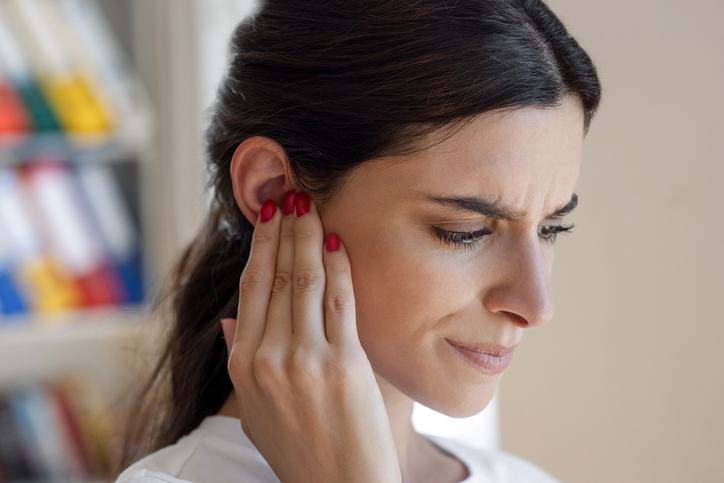How TMJ Disorders Can Lead to Ear Pain and Hearing Issues

Have you ever experienced ear pain, ringing in your ears, or even difficulty hearing without an obvious ear infection or other ear-related condition? If so, your temporomandibular joint (TMJ) might be the culprit. The TMJ is a critical joint that allows you to move your jaw when speaking, eating, and even yawning. However, when this joint is not functioning properly—a condition known as temporomandibular joint disorder (TMD)—it can lead to a range of unexpected symptoms, including ear discomfort and hearing issues.
If you’re struggling with persistent ear-related symptoms, understanding how TMJ disorders affect the ears can help you find the right treatment and relief. Let’s explore the connection between TMJ and ear problems and what you can do about it.
What Are TMJ Disorders?
TMJ disorders (TMD) refer to a group of conditions that affect the function and comfort of the temporomandibular joint. This joint connects your lower jaw (mandible) to your skull, allowing for smooth jaw movement. When the TMJ is misaligned or under stress, it can lead to pain and dysfunction.
Common Causes of TMJ Disorders
TMD can develop due to several factors, including:
- Teeth grinding (bruxism): Habitual clenching and grinding place excessive strain on the TMJ.
- Jaw misalignment: Poor bite alignment can lead to uneven stress on the joint.
- Arthritis: Osteoarthritis or rheumatoid arthritis can cause joint inflammation and deterioration.
- Trauma or injury: A direct injury to the jaw or head can lead to TMJ dysfunction.
- Chronic stress: Stress-related tension often results in jaw clenching, increasing strain on the joint.
Symptoms of TMJ Disorders
TMD symptoms go beyond jaw pain and can affect various areas of the face, head, and neck. Common symptoms include:
- Jaw pain or tenderness
- Difficulty chewing or opening the mouth fully
- Clicking or popping sounds in the jaw
- Headaches or migraines
- Facial soreness
- Ear discomfort, including pain, fullness, and tinnitus
But why does the TMJ affect the ears? The answer lies in the anatomy of the jaw and its close relationship with the ear structures.
How TMJ Disorders Cause Ear Pain and Hearing Issues
The TMJ is located directly in front of the ear canal, and its dysfunction can create a ripple effect that impacts ear health. Here’s how TMD contributes to ear-related symptoms:
Shared Nerve Pathways Lead to Referred Pain
The TMJ shares nerve connections with the ear through the trigeminal nerve, one of the largest nerves in the head. When the TMJ is inflamed or irritated, pain signals can travel along these shared pathways, causing discomfort in the ears, even though the issue originates in the jaw.
Muscle Tension and Pressure on the Ear Structures
TMJ dysfunction often results in muscle tension and inflammation in the jaw area. This tension can extend to the muscles surrounding the ears, leading to sensations of ear pain or fullness. In some cases, the increased pressure can even affect the function of the Eustachian tube, which helps regulate ear pressure, leading to a clogged or muffled sensation.
Common Ear Symptoms Linked to TMJ Disorders
TMD-related ear symptoms can vary in severity, but they often include:
- Ear pain: Dull or sharp discomfort in or around the ear.
- Fullness in the ear: A sensation similar to having water or pressure trapped inside the ear.
- Tinnitus: Ringing, buzzing, or humming sounds in the ear, often without an external source.
- Hearing changes: Some patients experience temporary muffled hearing or sensitivity to sounds.
- Dizziness or balance problems: TMJ-related muscle tension can impact the vestibular system, leading to dizziness.
While these symptoms can be distressing, there are effective ways to manage them and find relief.
Effective Treatment Options for TMJ-Related Ear Symptoms
Addressing the root cause of TMJ disorders is key to alleviating ear-related symptoms. A combination of conservative treatments and, if necessary, professional interventions can help restore comfort and function.
Lifestyle Changes and Home Remedies
- Avoid excessive jaw strain: Stick to soft foods and avoid chewing gum to reduce stress on the TMJ.
- Stress management: Relaxation techniques such as meditation and deep breathing can help minimize jaw tension.
- Apply heat or cold packs: Alternating heat and ice therapy can relieve muscle tension and inflammation.
- Jaw exercises: Gentle stretches and movements can improve jaw mobility and reduce stiffness.
Professional Treatments for TMJ Disorders
If self-care measures do not provide sufficient relief, seeking professional care can help address the underlying TMJ dysfunction. Treatment options may include:
- Oral appliances or nightguards: Custom-fitted devices can reduce teeth grinding and align the jaw properly.
- Physical therapy: Targeted exercises and massage techniques can alleviate muscle tension.
- Medication: Anti-inflammatory medications may help reduce pain and swelling.
- TMJ-focused dental treatments: In some cases, adjusting the bite or restoring damaged teeth can improve TMJ alignment.
For more severe cases, a referral to a TMJ specialist may be necessary for advanced treatment options.
When to See a Professional and Next Steps
If you are experiencing persistent ear pain, ringing, or other ear-related symptoms that do not seem to be caused by an ear infection, it may be time to evaluate your TMJ health. Signs that professional care may be needed include:
- Chronic or worsening ear pain
- Frequent jaw discomfort or locking
- Difficulty chewing or speaking
- Ongoing tinnitus or hearing changes
- Balance issues or dizziness
Seeking timely treatment for TMJ disorders can improve your overall well-being and help prevent long-term complications. Our team at Gateway Center for Sleep Apnea & TMJ Therapy specializes in diagnosing and treating TMJ-related conditions to help you find relief.
Schedule a Consultation for TMJ Relief
If you’re struggling with ear pain or hearing issues that may be linked to TMJ disorders, don’t wait to seek help. Contact us today to schedule a consultation with Dr. Postol. We are here to provide expert care and personalized solutions to restore your comfort and quality of life.
